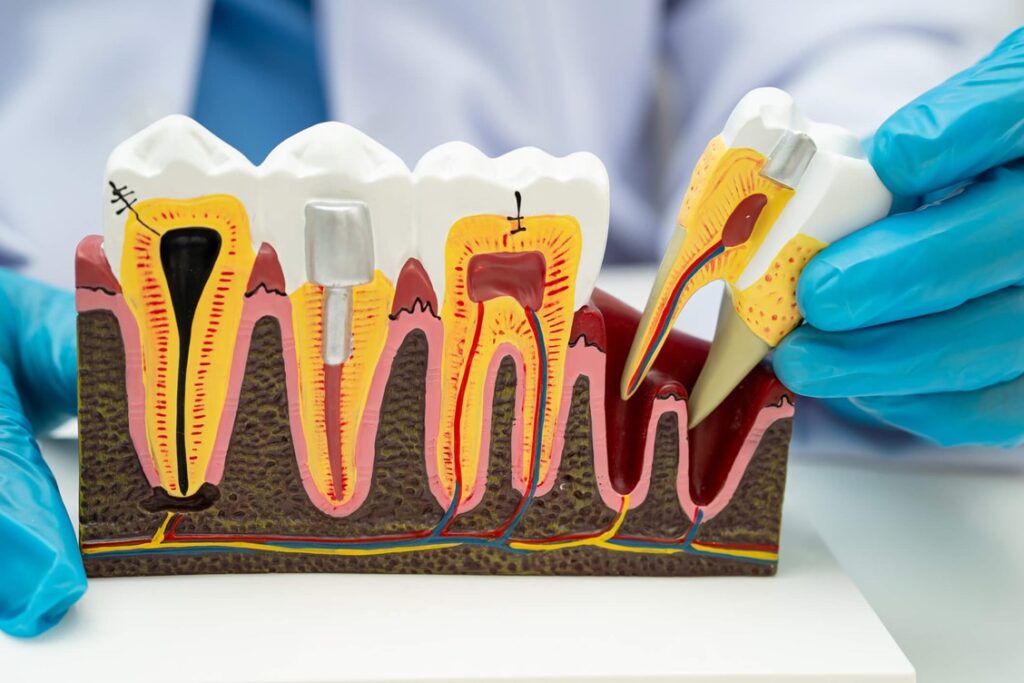Signs You May Need a Root Canal
Tooth pain isn’t always a loud scream for attention—sometimes it builds up slowly until it interferes with everything from your morning coffee to your evening plans. That’s often how root canal issues begin. They give you subtle signs that something’s wrong, and then progress until they’re impossible to ignore.
That’s where root canal treatment enters the picture. This offers a reliable way to relieve tooth pain and stop the infection. Could you be due for a root canal? Learn more about this procedure and whether it’s time to call the dentist.
What Is a Root Canal?
The root canal of a tooth is the inner chamber spanning from the crown to the roots. It houses the pulp, which contains nerves, blood vessels, and connective tissue. When this area becomes infected or inflamed due to decay, trauma, or deep cracks, treatment is often required to prevent pain and preserve the tooth.
This treatment is what people often call a “root canal,” also known as endodontic treatment. It involves removing damaged tissue, thoroughly cleaning the tooth’s interior, and sealing it to prevent future problems.
The goal is to relieve discomfort, eliminate the source of infection, preserve your tooth’s structure, and maintain your bite alignment. A root canal may also prevent more invasive procedures like extractions, implants, or bridges.

7 Root Canal Signs
Here are some of the most common signs you should visit the dentist for a possible root canal treatment:
- Persistent tooth pain: Ongoing pain, whether dull or sharp, often points to an infection deep inside the tooth. It might fade at times, but if it keeps returning or worsens when lying down or chewing, don’t ignore it.
- Tooth sensitivity to hot or cold: Sensitivity that lingers long after exposure to hot drinks or ice water might mean the nerve has been compromised. A quick jolt that fades is less concerning than sensitivity that lingers or worsens.
- Pain while biting or chewing: Pain from simple chewing motions could be a sign of pressure affecting a damaged nerve or surrounding bone. This type of discomfort often feels localized and sharp.
- Swollen or tender gums: If your gums appear swollen, reddish, or sore to the touch, that could signal an abscess or infection spreading from inside the root. Sometimes, a small pimple-like bump may appear on the gum, which might drain pus if popped.
- Tooth discoloration: Teeth don’t change color out of nowhere. A single tooth that darkens or turns gray may be experiencing internal tissue breakdown, even if there’s no pain.
- Cracked or chipped tooth: Any break in the enamel can expose the pulp to bacteria. Pay attention to any new symptoms if you’ve chipped a tooth recently.
- Loose tooth: If a tooth feels unstable even though it hasn’t experienced direct trauma, it might indicate inflammation around the root. Infection weakens the surrounding bone, causing the tooth to shift or loosen.
Tips to Lower Your Risk of a Root Canal
The trick to avoiding a root canal treatment is to prevent infection. While some causes, like injury or genetics, can’t always be avoided, many risk factors are in your control. The following oral hygiene habits make all the difference:
- Brush twice a day with fluoride toothpaste.
- Floss once daily to remove plaque between your teeth.
- Rinse occasionally with fluoride mouthwash.
- Avoid chewing on ice, pens, or hard candies.
- Limit sugary drinks and snacks, especially between meals.
- Wear a mouth guard when playing sports.
- Schedule dental cleanings and checkups every six months.
Why Root Canals Have a Bad Reputation
People have misunderstood root canals for decades. They are traditionally viewed as painful and invasive—something to dread rather than embrace as an effective treatment method. While they may have deserved this bad rap years ago, dental technology and anesthetics have come a long way. As a result, most root canals today feel similar to having a cavity filled. What patients remember most now is the pain relief that follows the procedure.
Why Choose S&C Dental Scottsdale for Your Root Canal?
Choosing an experienced endodontist in Scottsdale transforms what could be a stressful situation into a calm, successful treatment. Our patients come to us with high expectations, and we exceed them through a combination of advanced clinical skills and personal care.
We’ve treated thousands of people with a wide range of dental concerns using a thorough yet calming approach to reduce anxiety and deliver real relief. Whether you’re managing a sudden flare-up or addressing a long-standing issue, you’ll find our service to be both professional and personal.
Consult Our Endodontist in Scottsdale
If you notice any root canal signs, like tooth sensitivity, pain when chewing, or gum swelling, don’t wait. Putting off treatment will only delay the relief you could enjoy if you come in today. Contact S&C Dental Scottsdale to schedule an appointment. We’ll assess your painful tooth and recommend the most effective solution, whether that’s a root canal or another form of treatment.
